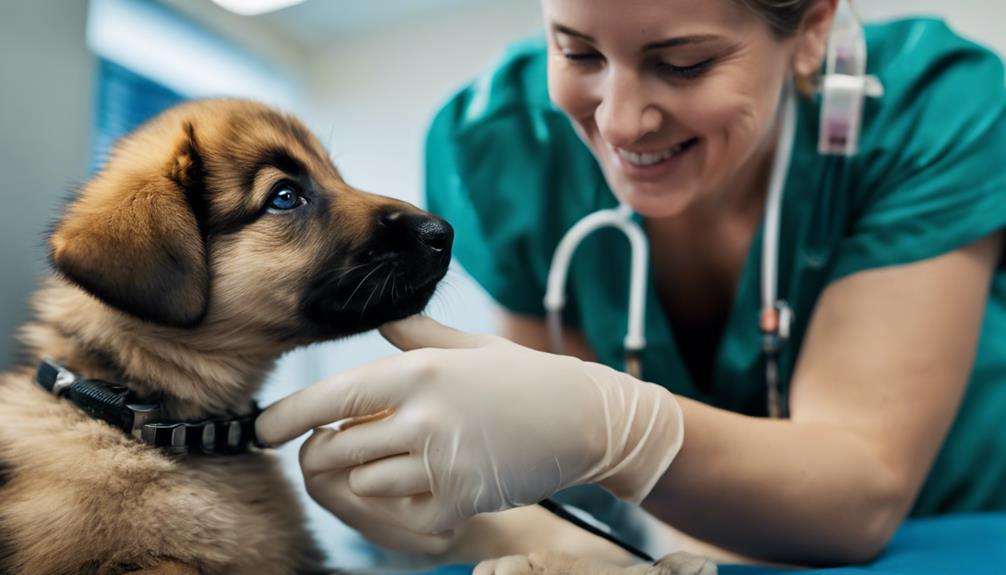🐾 Paw-some Partnership Alert! 🐾
As a pack of German Shepherd enthusiasts at MixGermanShepherd.com, we're always sniffing out the best products for our furry friends. Guess what? When you fetch something from Amazon through our links, we earn a little treat! 🦴
Did you know that German Shepherd mix puppies are prone to certain health issues that can be effectively managed with early veterinary care? From addressing genetic predispositions to tailoring preventive measures, the significance of proactive health management cannot be overstated. By understanding the specific needs of these unique mixed breeds and implementing a comprehensive care plan, you can set the foundation for a healthy and thriving companion.
Key Takeaways
- Early veterinary care is crucial for optimal health and well-being.
- Establish a personalized vaccination and preventive care plan.
- Regular vet visits ensure early detection of health issues.
- Building a relationship with a trusted vet is essential for long-term well-being.
Benefits of Early Veterinary Check-ups

Early veterinary check-ups for your German Shepherd mix puppy are crucial for ensuring their optimal health and well-being. These initial visits play a vital role in identifying any underlying health issues, such as genetic conditions or developmental problems, that may require early intervention. Regular veterinary check-ups also allow for the timely administration of vaccinations and preventive care tailored to the specific needs of German Shepherd mix puppies.
In addition to addressing health concerns, these early visits provide an excellent opportunity to discuss crucial aspects of your puppy’s care, including nutrition, behavior, socialization, and training. Your veterinarian can offer valuable guidance on how to best socialize your German Shepherd mix puppy and provide tips for effective training strategies. By establishing a relationship with a trusted veterinarian early on, you set the foundation for a lifetime of comprehensive healthcare that promotes the well-being and happiness of your furry companion.
Vaccination Schedule for German Shepherd Mixes

To ensure the optimal health and well-being of your German Shepherd mix puppy, establishing and following a tailored vaccination schedule is essential. German Shepherd mix puppies require core vaccinations such as distemper, parvovirus, adenovirus, and rabies to protect them from common infectious diseases and to help build a strong immune system. Typically, the vaccination schedule for German Shepherd mixes begins when they are 6-8 weeks old and includes multiple boosters until they reach around 16 weeks of age. It is crucial to consult with your veterinarian to create a personalized vaccination plan based on your puppy’s individual health needs. By adhering to a proper vaccination schedule, you are taking proactive steps to ensure the long-term health and well-being of your German Shepherd mix puppy.
| Vaccination | Schedule |
|---|---|
| Distemper | 6-8 weeks, 10-12 weeks |
| Parvovirus | 6-8 weeks, 10-12 weeks |
| Adenovirus | 6-8 weeks, 10-12 weeks |
| Rabies | Around 16 weeks |
| Boosters | As recommended by vet |
Preventive Care Measures for Puppies

Upon bringing your German Shepherd mix puppy home, initiating preventive care measures promptly is crucial for their overall health and well-being. Schedule your puppy’s first veterinary visit between 6-8 weeks of age for a comprehensive health assessment. This initial visit is essential for setting up vaccination schedules, discussing preventive measures, and addressing any health issues early on. Your puppy may require deworming, initial vaccinations, and flea/tick prevention, all of which can be taken care of during this first visit. Building a relationship with your veterinarian from the start will ensure proper guidance on nutrition, training, and overall care tailored to your puppy’s specific needs. Regular check-ups and preventive care in the early stages of your German Shepherd mix puppy’s life are vital for promoting their long-term health and well-being. Prioritizing preventive measures now will help your puppy grow into a healthy and happy companion.
Common Health Issues in German Shepherd Mixes

In caring for your German Shepherd mix, awareness of common health issues prevalent in the breed is crucial for proactive management and early intervention. German Shepherd mixes may inherit health issues like hip dysplasia and degenerative myelopathy from the purebred German Shepherd lineage. Understanding the genetic predispositions of German Shepherd mixes is essential for early detection and management of potential health concerns. Regular veterinary check-ups play a vital role in monitoring your German Shepherd mix’s overall health and addressing any developing issues promptly. Dental care is important to prevent dental disease, which is prevalent in the breed and its mixes. Tailored vaccination protocols based on individual factors and breed-specific risks are necessary to ensure optimal protection against infections for German Shepherd mixes. By staying informed about these common health issues and actively engaging in preventive care measures, you can promote the well-being and longevity of your beloved German Shepherd mix.
Importance of Regular Vet Visits

Transitioning from understanding common health issues in German Shepherd mixes, regular veterinary visits for your German Shepherd mix puppy are vital for ensuring their overall well-being and longevity. These visits are not just about treating illnesses but also about preventive care, monitoring growth and development, and establishing a strong foundation for lifelong health. Check-ups help in the early detection of health issues, ensuring timely intervention and treatment. Monitoring vaccination schedules is crucial to protect your puppy from preventable diseases. Moreover, regular visits create a bond with your vet, making future care more personalized and effective. Below is a table highlighting the key reasons why regular vet visits are essential for the health and well-being of your German Shepherd mix puppy:
| Key Reasons for Regular Vet Visits | |
|---|---|
| Early detection of health issues | |
| Monitoring growth and development | |
| Ensuring proper vaccination schedules | |
| Implementing preventive measures | |
| Establishing a relationship with the vet |
Frequently Asked Questions
How Do You Take Care of a German Shepherd Mix?
To care for a German Shepherd mix, focus on training, grooming, exercise, socialization, health checks, nutrition, behavior, playtime, housetraining, and bonding. These steps lead to a healthy and happy pup. Start early for best results.
At What Age Should a German Shepherd Be Spayed?
For a German Shepherd, ideally spay between 6 and 9 months. Spaying benefits include reducing cancer risks. Consult your vet to determine the best timing. Spaying early can contribute to long-term health.
What to Know Before Buying German Shepherd Puppy?
Before buying a German Shepherd puppy, choose a reputable breeder, research breed needs, commit to long-term care, understand temperament, exercise, and socialization. Ensure early vet care for health issues, preventive plans, and a healthy start.
What Are the Demography and Disorders of German Shepherd Dogs Under Primary Veterinary Care in the Uk?
When caring for your German Shepherd, prioritize preventive care, regular vaccinations, and addressing health concerns promptly. Provide balanced nutrition, ample exercise, grooming, and socialization. Consistent training fosters good behavior. Remember: early veterinary attention is crucial for a healthy, happy pup.
Conclusion
In conclusion, early veterinary care for German Shepherd mix puppies is essential for their well-being. Regular check-ups and preventive measures can help address potential health issues and ensure a long and healthy life for your furry friend. For example, Sarah noticed her German Shepherd mix puppy, Max, was constantly scratching and losing fur. A visit to the vet revealed he had a skin allergy that was easily treatable with medication, thanks to early detection. Regular vet visits can make a difference in your puppy’s health.
